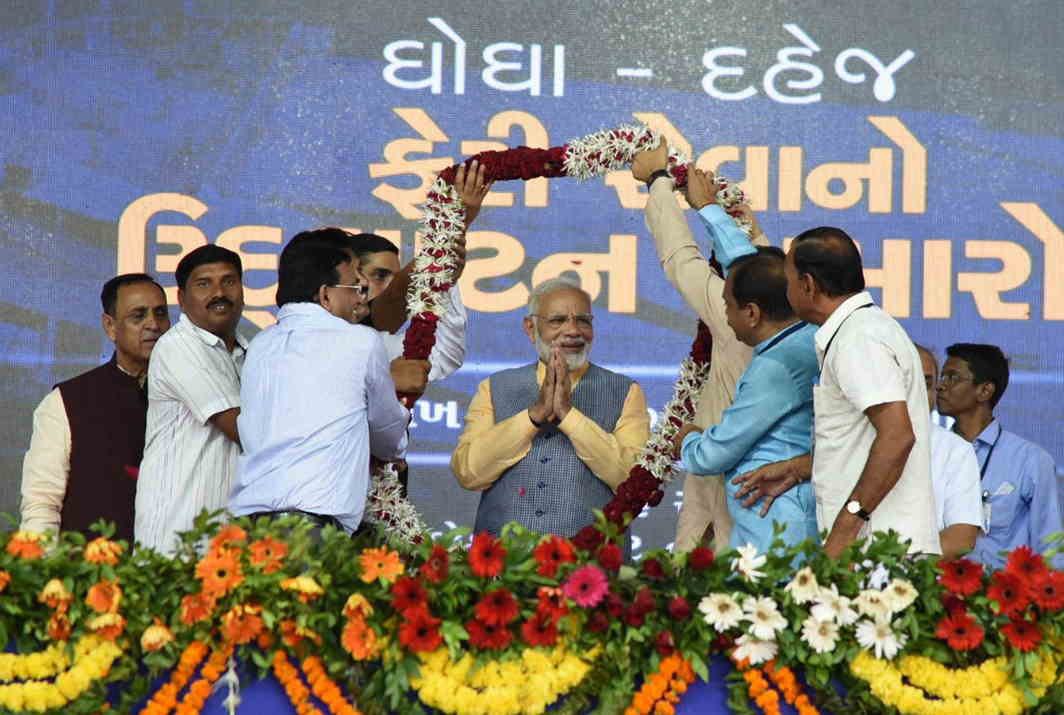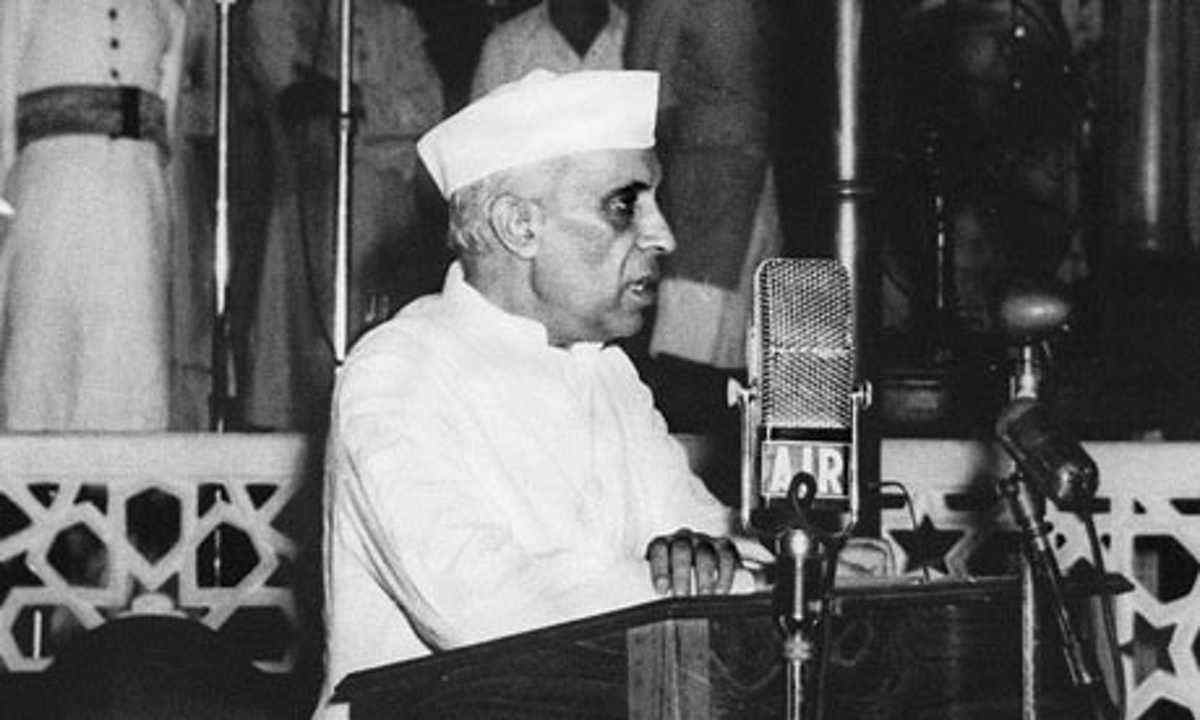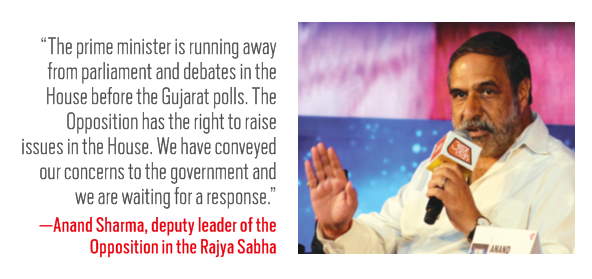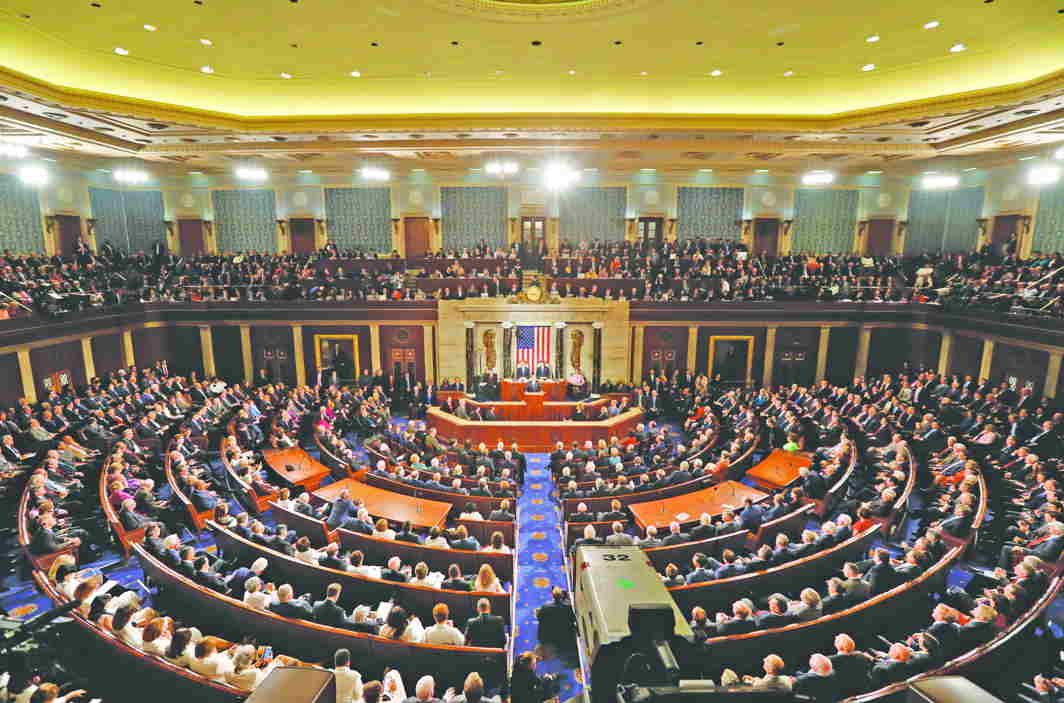With no news of whether this session will be called, the Opposition is up in arms. But the ruling BJP does not want to face an acrimonious House before the Gujarat polls
~By Kalyani Shankar
When entering Parliament for the first time before he was elected leader of the BJP Parliamentary Party in May 2014, Narendra Modi kneeled on the steps of the House and described it as a “temple of democracy”. Later, while addressing MPs during the commemoration of the Constitution to mark the 125th birth anniversary of Dr BR Ambedkar, the prime minister said the religion of his government was “India first” and referred to the Constitution as its “holy book”. The opposition is now asking whether all this was the mere rhetoric of a politician or whether Modi really meant it.
The sudden focus on parliament is because the winter session has not been called so far. Normally by now, the schedule should have been notified. The constitution specifies that “six months shall not intervene” between each session, though it does not spell out how many times parliament must meet in a year. The norm for various sessions are as follows: Budget (February–May), monsoon (July-August) and winter (November-December). This year, the Monsoon Session ended on August 11.

Incidentally, the 2016 winter session was the least productive one for both the Rajya Sabha and the Lok Sabha in the last 15 years, according to the PRS Legislative Research, a non-profit organisation. While the Lok Sabha lost 107 hours due to disruptions, the Rajya Sabha lost 101 hours.
Regrettably, Parliament sessions have become progressively shorter. In the last decade, the Lok Sabha met for an average of 70 days in a year as against an average of 120 days in the 1950s and ’60s. The House of Commons in the UK met for an average of 150 days, while the US Congress met for an average of 140 days during the same period.
The General Purpose Committee of the Lok Sabha on April 22, 1955, recommended a timetable for all the sessions, with more or less fixed dates. The Constitution Review Commission in March 2002 recommended that the minimum number of working days for the Lok Sabha and the Rajya Sabha should be fixed at 120 and 100, respectively.
By not convening the winter session at the usual time, the Modi government is playing into the hands of the Opposition. The 18 anti-BJP Opposition parties are raising their pitch and faulting the government for not convening the winter session. They say the government has a cavalier attitude towards Parliament. The Opposition alleges that Modi has no regard for Parliament, and except for customary addresses, the prime minister has not utilised Parliament for his announcements.

Indeed, Modi has shown a distinct preference for rallies, radio addresses and tweets, where dialogue is excluded. This includes announcing demonetisation through the electronic media and then subsequently addressing the policy in public rallies. The Opposition contends that under Article 75 of the Constitution, the prime minister and his council of ministers are “collectively responsible to the House of the people”.
Congress leaders point out that in contrast, India’s first prime minister Jawaharlal Nehru had shown great deference and sensitivity to Parliament. What the Congress forgets is that from the time of Indira Gandhi, Parliament’s stature was diminished. Her successors, including Rajiv Gandhi, maintained a level of indifference towards it.
POLL CAMPAIGN
So why has the winter session not been convened so far? Informal reasons cited are that the prime minister, ministers as well as MPs from both sides will be busy in the Gujarat campaign. Secondly, the government feels a lack of legislative agenda. The real reason is different. The ruling party does not want an acrimonious winter session as this might impact the BJP’s poll prospects in Gujarat.
The deputy leader of the Opposition in the Rajya Sabha, Anand Sharma, told India Legal: “The prime minister is running away from parliament and debates in the House before the Gujarat polls. The Opposition has the right to raise issues in the House. We have conveyed our concerns to the government and we are waiting for a response.”
 CPI leader D Raja commented: “Instead of Modi’s promise of maximum governance, minimum government, now it appears to be maximum government, minimum Parliament. In a country like ours, assembly elections should not be an excuse not to convene a session. Why is the BJP scared of Parliament?”
CPI leader D Raja commented: “Instead of Modi’s promise of maximum governance, minimum government, now it appears to be maximum government, minimum Parliament. In a country like ours, assembly elections should not be an excuse not to convene a session. Why is the BJP scared of Parliament?”
The Trinamool Congress, the Congress and the Samajwadi Party plan to approach the Lok Sabha Speaker to seek her intervention. The Opposition plans to give a notice, demanding a discussion on media reports related to BJP President Amit Shah.
The Modi government hopes for a shorter winter session after the Gujarat polls so that it can help insulate it from the Opposition attack. This year, the monsoon session was the third session of the year, as the budget session was converted into two separate sessions. Interestingly, after more than three-and-a-half years, the Modi government may well be in a commanding position in both Houses of parliament. Though the ruling BJP is still not in a majority in the Upper House, two things are in its favour. The first is that the BJP has become the single largest party in the Rajya Sabha, overtaking the Congress, and the second is that with the JD(U) led by Nitish Kumar joining the NDA, and the AIADMK supporting the government, it will be easier for it to push through its bills. Despite this, the BJP does not want to take any chances.
However, this is not the first time that a session has been curtailed. According to parliament officials, in 2001, the House was adjourned sine die on April 27 in view of the assembly elections in five states, with the result that eight working days in May were lost. In 2007, the second part of the budget session was adjourned sine die on March 26 instead of April 18 in view of the UP polls. In 2008, the monsoon session was extended to November-December to prevent a second no-confidence motion against the Manmohan Singh government. In 2011, the first part of the session was extended up to March 25, while the second part from April 5 to 24 was cancelled because of assembly polls in five states. In 2015, the budget session of the Rajya Sabha was curtailed to enable the reissuance of the land acquisition ordinance. In 2016, the first part of the budget session was prorogued to allow promulgation of an ordinance to bring and pass a vote on account for Uttarakhand which was under President’s Rule. An ordinance cannot be promulgated when the House is in session. So, it was prorogued and the second session began on April 25.
Both the UPA and the NDA have curtailed or extended Parliament sessions. The only difference is that while the shortening or extending of the session was undertaken on the advice of the Business Advisory Committee, that has not happened this time as the winter session has not been called so far.

The Indian Express, quoting top government sources, claimed: “There are indications that the session may actually start after the last day of campaigning in Gujarat, which is on December 12.” In Parliament circles, the rumour is that the winter session could be held from December 12 to 22. The Budget will be presented on February 1. The government has time till February for the next session. The Cabinet Committee on Parliamentary Affairs headed by Home Minister Rajnath Singh is likely to decide the date soon.
A submission from Attorney General KK Venugopal to the Supreme Court on behalf of the government this week that it will introduce a bill to provide voting rights to over 25 million non-resident Indians in the winter session provides hope that a curtailed session is likely after the Gujarat polls.


